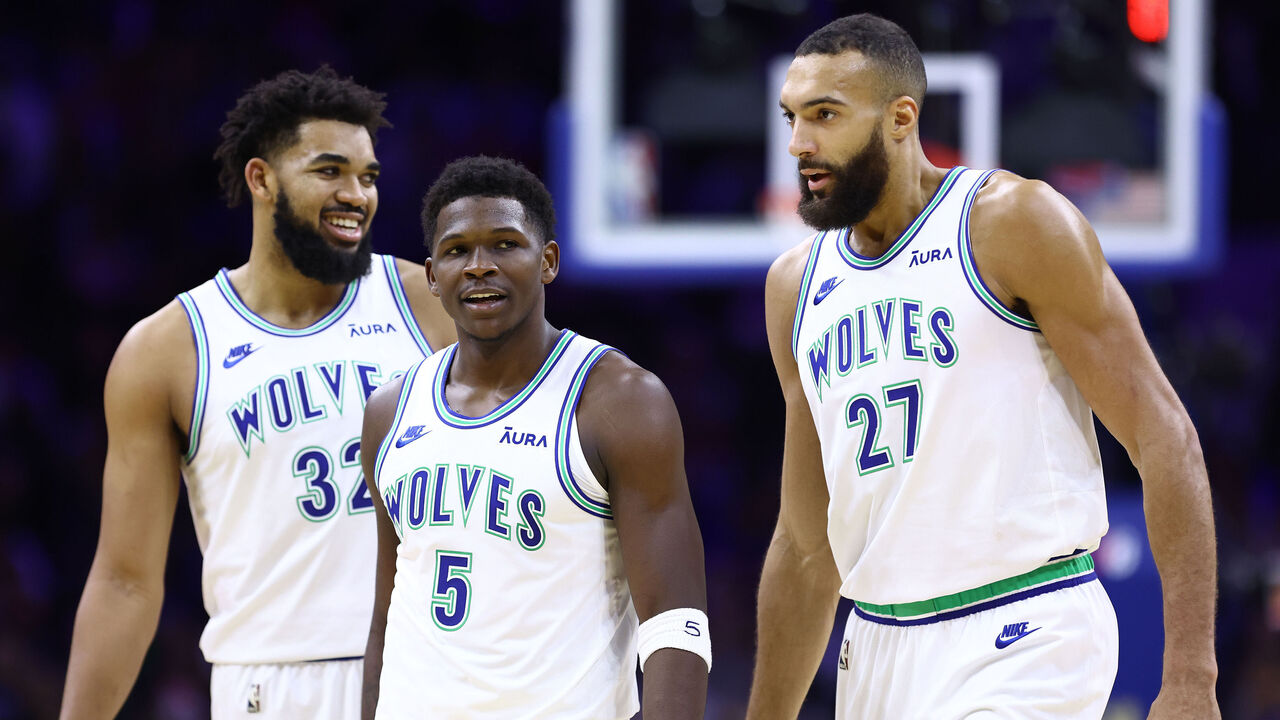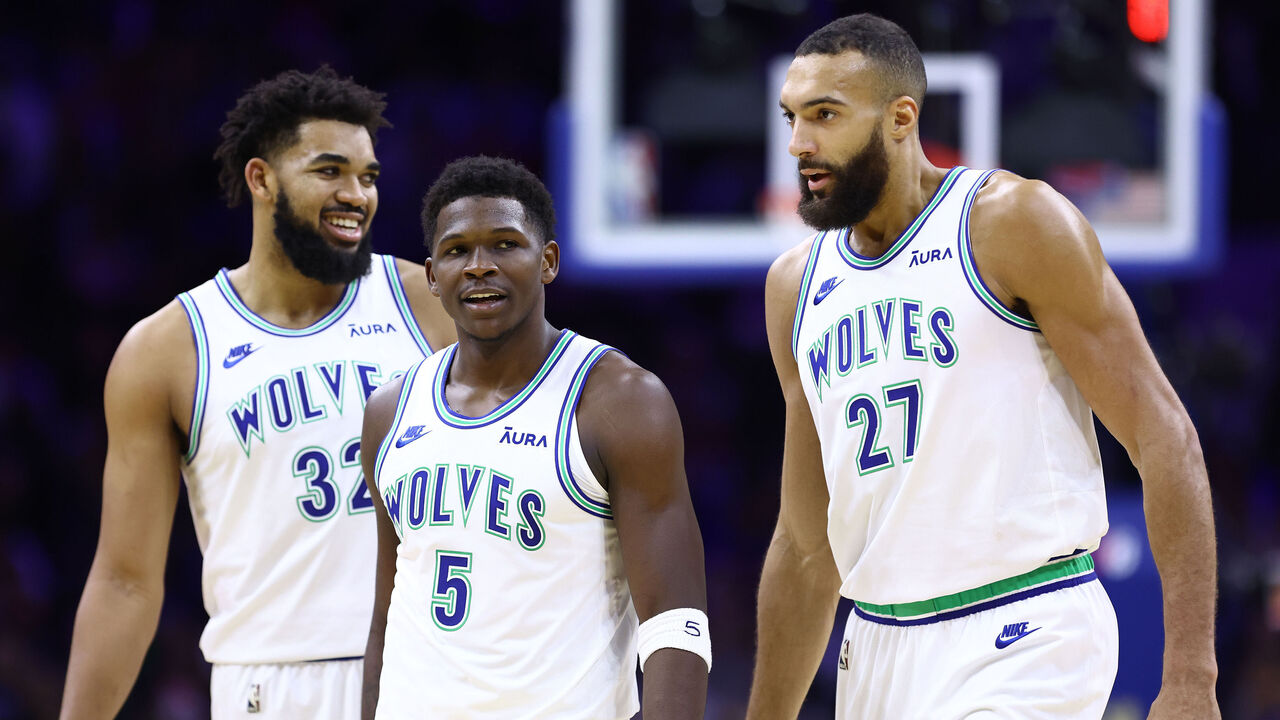KAT's injury is cruel twist in one of season's best stories
The Minnesota Timberwolves and Karl-Anthony Towns really are perfect for each other, because the basketball gods seemingly won’t let either of them have nice things.
The latest twist of the knife for team and player comes during the stretch run of arguably the best (and at very worst the second-best) season in franchise history. With Minnesota and the Oklahoma City Thunder in a dead heat for the No. 1 seed in the Western Conference less than six weeks from the start of the playoffs, Towns has reportedly been diagnosed with a torn meniscus in his left knee.
Recovery timelines for meniscus injuries vary depending on severity, location, and treatment plan, and Towns is reportedly weighing his options. Even in a best-case scenario, Towns is looking at multiple weeks on the shelf and likely the remainder of the regular season at minimum.
An optimist might hearken back to 2022 when Robert Williams III returned to action just over three weeks after undergoing a meniscectomy and helped the Boston Celtics reach the Finals. But Williams was plagued by knee swelling throughout that playoff run and was forced to undergo another surgery in the offseason that limited him to 35 games in 2022-23. In other words, the Timberwolves need to get used to playing without their All-Star power forward – which is a reality they’re unfortunately pretty familiar with.
Last year, their first season with Rudy Gobert in the fold was effectively torpedoed because Towns missed all of training camp with a throat infection and then was waylaid by a calf injury that cost him four months. The team patched things together without him, and he finally returned for the final eight games of the regular season … just in time to watch Naz Reid break his wrist and Jaden McDaniels knock himself out for the playoffs by punching a wall. Minnesota finished the season 42-40, got bounced by the Nuggets in five games, and was clowned for what many viewed as an ill-conceived all-in gamble on Gobert.
This season, though, everything clicked. Until Towns’ injury, the T-Wolves enjoyed pristine health (their top eight players had missed just 23 games combined), finally allowing them to nail down an identity that perfectly suited their personnel. It also allowed Towns and Gobert to figure out how to share a frontcourt at both ends of the floor, while Anthony Edwards and Mike Conley got a better feel for how to play with both of them. Towns went to the All-Star Game and dropped 50 points.
With 20 games left in the regular season, Minnesota has already eclipsed last year’s win total. The team’s defense is not only the best in the NBA, it’s 7.1 points per 100 possessions better than the league average, making it the 11th-stingiest unit in the last 60 years, according to Basketball Reference. It’s been a season of redemption for the front office, the coaching staff, Gobert, and, most of all, Towns.

While Towns obviously isn’t the driving force behind that elite defense, his improvement on that side of the ball has been a crucial component, as has the simple fact that he’s a 7-footer playing the 4. That’s a huge part of what gives the Wolves their identity and makes them unique. It wouldn’t work nearly as well if not for his increased diligence as a low-man helper and rebounder, along with his improved ability to defend in space and navigate screening actions against 4s who play more like wings.
It also wouldn’t work on offense if not for Towns spacing the floor and operating in a variety of different roles. He spots up, pops, rolls, drives closeouts and mismatches, makes plays out of the post, orchestrates from the high slot, and routinely finds Gobert with high-low feeds. He ranks 13th in the NBA in 3-point percentage (42.3%), and his 62.8% true-shooting mark is sixth in the league among players with usage rates above 25% (behind only Giannis Antetokounmpo, Nikola Jokic, Shai Gilgeous-Alexander, Joel Embiid, and Kevin Durant). Minnesota’s offense hasn’t been any great shakes, but it’s 10.1 points per 100 worse with Towns on the bench.
Now the Timberwolves are left to try to fend off not only the Thunder, but also the Nuggets and Clippers – who are just one and 2.5 games back, respectively. Considering how much is left to be decided as that top four sorts itself out, from first-round matchups to home-court advantage in the second round and beyond, this could prove to be a crippling blow to a team that’s won only two playoff series in its 35-year history.
Securing the 1-seed would probably mean avoiding the Nuggets until the conference finals and having home court in a potential showdown. That scenario feels a whole lot less likely today. And in case you haven’t heard, there’s probably a salary crunch coming for the Wolves; this season may be (or may have been) their best shot with the current core. Towns has been his own worst enemy in past postseasons, but in this role on this team, it felt like he had a good chance to exorcise a lot of those demons. Hopefully, he’ll still get that chance.
In the meantime, this is a resilient bunch, and even without Towns, they’ll be tough to play against. That defense isn’t going anywhere and, if anything, may be a tad better without him. It’ll be interesting to see who’s inserted into the starting lineup in his stead; last year it was Kyle Anderson, but Slo Mo’s having a tough season and would likely make the floor too cramped. If the Wolves are comfortable playing smaller, Nickeil Alexander-Walker should get the nod, which will make them faster and more impenetrable on the perimeter. (He, McDaniels, and Edwards are all All-Defense-caliber containers at the point of attack.)
Reid is the most obvious fill-in for Towns based on size and abilities (he’s at 41% from deep himself, with a comparable array of ball skills), but as Minnesota’s only rotation big off the bench, he probably needs to stay there. He could wind up closing a bunch of games, though. And for what it’s worth, the Gobert-Reid frontcourt has been utterly dominant across 640 minutes, outscoring opponents by 14 points per 100 and holding them to a 96.2 offensive rating.
This doesn’t have to be a death knell for the Wolves’ hopes of advancing in the postseason for the first time since 2004, especially if Towns can make it back in time. But it certainly dims their prospects of a deep run. For a team and a player that looked poised to finally have their moment in the spotlight after so much disappointment, that feels particularly cruel.


